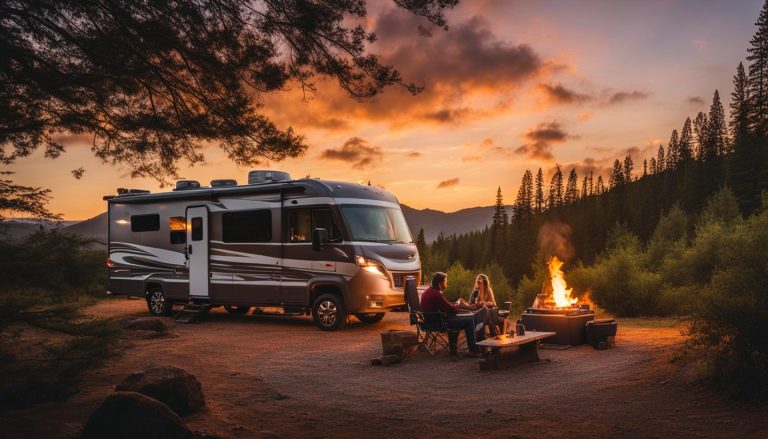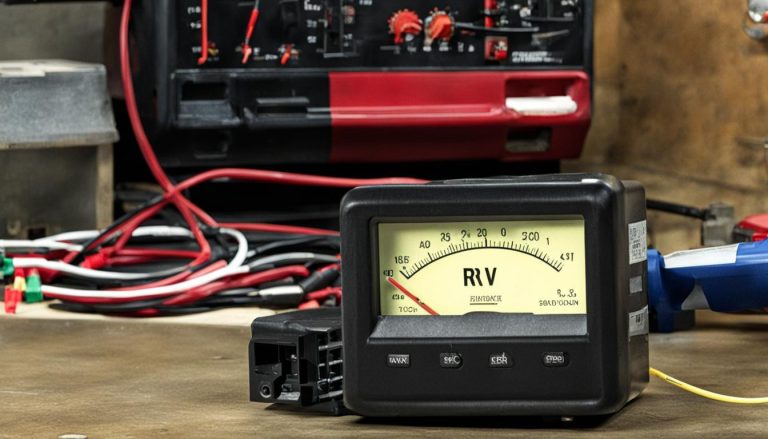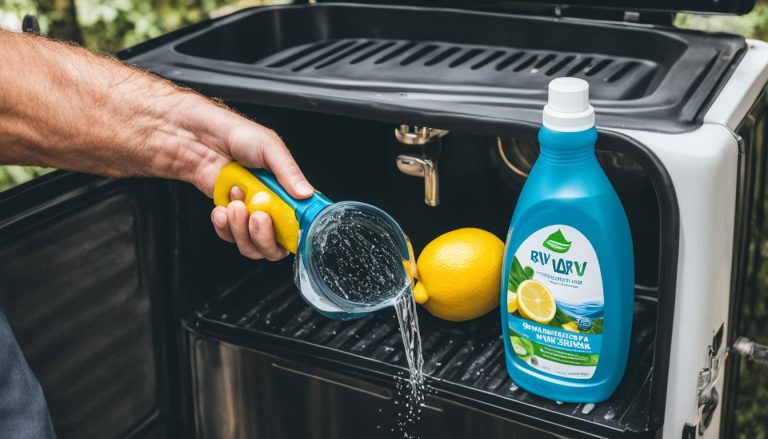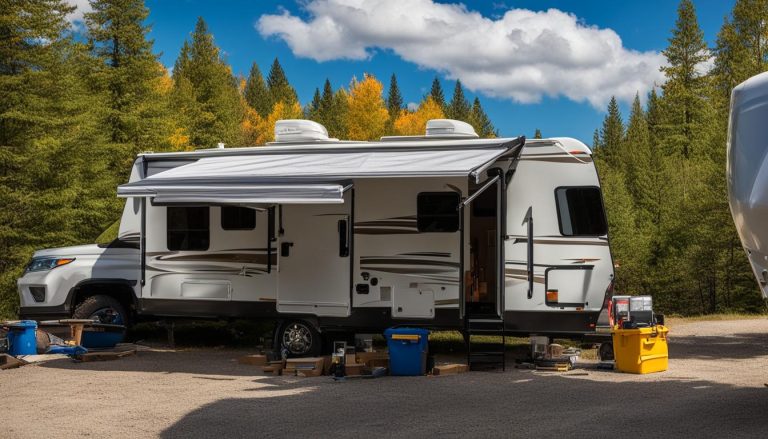Become an RV Technician: Your Career Guide
gorvlifestyle.com and its partners may earn a commission if you purchase a product through one of our links
With the growing popularity of RV travel in the United States, the demand for skilled RV technicians is on the rise. This comprehensive career guide will provide you with all the information you need to kickstart your journey to becoming an RV technician. We’ll explore the training options, certification requirements, and the exciting career opportunities available in this fast-growing industry.
Key Takeaways:
- RV technician careers are in high demand due to the increasing popularity of RV travel.
- Training and certification are necessary to become an RV technician.
- RV technicians work with a wide range of recreational vehicles, ensuring they are safe and functional.
- This career offers job stability, flexibility, and competitive salaries.
- There is room for advancement and specialization within the RV technician field.
Why Become an RV Technician
Are you passionate about recreational vehicles (RVs) and their inner workings? Consider a career as an RV technician, where you’ll have the opportunity to work with a wide variety of RVs, such as motor homes, travel trailers, and truck campers. As an RV technician, you’ll be responsible for diagnosing and repairing any issues with these vehicles, ensuring that they are safe and fully functional for their owners.
Becoming an RV technician offers numerous benefits, making it an appealing career choice. First and foremost, it provides job stability and growth. The RV industry is booming, with projected job growth of 8% to 14% from 2012 to 2022. This means there will be plenty of job opportunities for skilled technicians like yourself.
One of the key advantages of this career is the flexibility it offers. As an RV technician, you can work from anywhere, whether it’s at a dealership, repair shop, or even on the road. This allows you to pursue your passion while enjoying the freedom to travel and explore different locations.
Furthermore, the salary and benefits that come with an RV technician career are comprehensive. The average salary for RV technicians is around $45,000 per year, with potential for growth as you gain experience and expertise. Additionally, many employers offer perks such as health insurance, retirement plans, and paid time off.
“As an RV technician, you’ll have the opportunity to work with a wide variety of recreational vehicles, including motor homes, travel trailers, and truck campers.”
| Benefits of Becoming an RV Technician |
|---|
| Job stability and growth |
| Flexibility to work from anywhere |
| Comprehensive salary and benefits |
Becoming an RV technician allows you to turn your passion for RVs into a fulfilling career. Whether you’re a recent high school graduate or looking for a career change, pursuing this path can lead to a rewarding and exciting future.
Training and Certification
To become an RV technician, you will need to complete the necessary training and obtain certification. There are several options available for RV technician training, including:
- RV Technical Institute’s Technician Training Program: Considered the gold standard in the industry, this program provides hands-on training and instruction. It covers a wide range of topics, including electrical systems, chassis, appliances, and more.
- Vocational Certificate Programs: Many vocational schools and community colleges offer certificate programs in RV maintenance and repair technology. These programs provide comprehensive training in various aspects of RV maintenance.
Completing a formal training program will equip you with the necessary skills and knowledge to excel as an RV technician. Additionally, obtaining certification from recognized organizations can further enhance your credibility and job prospects in this field.
One of the leading organizations that offer certification for RV technicians is the Recreational Vehicle Industry Association (RVIA). RVIA’s certification program validates technicians’ skills and knowledge in servicing and repairing recreational vehicles.
Here’s an overview of the training and certification process:
- Enroll in a reputable RV technician school or program.
- Complete the required coursework, which may include hands-on training, classroom lectures, and practical exams.
- Gain practical experience through internships or apprenticeships.
- Apply for certification through the relevant certification body, such as RVIA.
- Pass the certification exam to demonstrate your competency as an RV technician.
By completing the necessary training and obtaining certification, you’ll position yourself as a qualified and highly skilled RV technician, ready to tackle the challenges of this exciting industry.
Skills and Qualifications
As an RV technician, you’ll need a combination of technical skills and qualifications. Good customer service skills are essential, as you’ll often interact with clients. Familiarity with hand and power tools, as well as knowledge of computers, electronics, and construction, is also important. Some of the key skills needed include:
- Manual and finger dexterity: As an RV technician, you’ll be working with small, intricate parts and components, requiring precise and delicate hand movements.
- Critical thinking: You’ll need to analyze problems and come up with effective solutions to troubleshoot and repair various systems in RVs.
- Problem-solving: RV technicians encounter a wide range of issues, so being able to identify problems and determine the best course of action is crucial.
- Ability to select the right tools for the job: Having a good understanding of different tools and their uses is essential to perform repairs and maintenance tasks efficiently.
Employers may also require a high school diploma or GED, and some may prefer candidates with vocational certificates or industry certifications. Here is a table summarizing the key skills and qualifications needed to become an RV technician:
| Skill/Qualification | Description |
|---|---|
| Customer service skills | Ability to effectively communicate and interact with clients, addressing their concerns and providing exceptional service. |
| Hand and power tool familiarity | Proficiency in using a variety of tools to perform repairs and maintenance tasks on RVs. |
| Computer and electronics knowledge | Understanding of computer systems and electronic components commonly found in RVs, such as wiring, appliances, and entertainment systems. |
| Construction knowledge | Basic understanding of construction principles and techniques to work with RV structures and interiors. |
| Manual and finger dexterity | Ability to handle small, delicate parts and perform intricate tasks requiring precise movements. |
| Critical thinking | Capability to analyze problems, diagnose issues, and develop effective solutions. |
| Problem-solving | Skills to identify challenges and determine appropriate steps to resolve them. |
| Ability to select the right tools for the job | Understanding of various tools and their uses to accomplish repairs and maintenance tasks efficiently. |
| High school diploma or GED | Completion of high school education or equivalent. |
| Vocational certificates or industry certifications | Additional qualifications in RV maintenance and repair, demonstrating expertise in the field. |
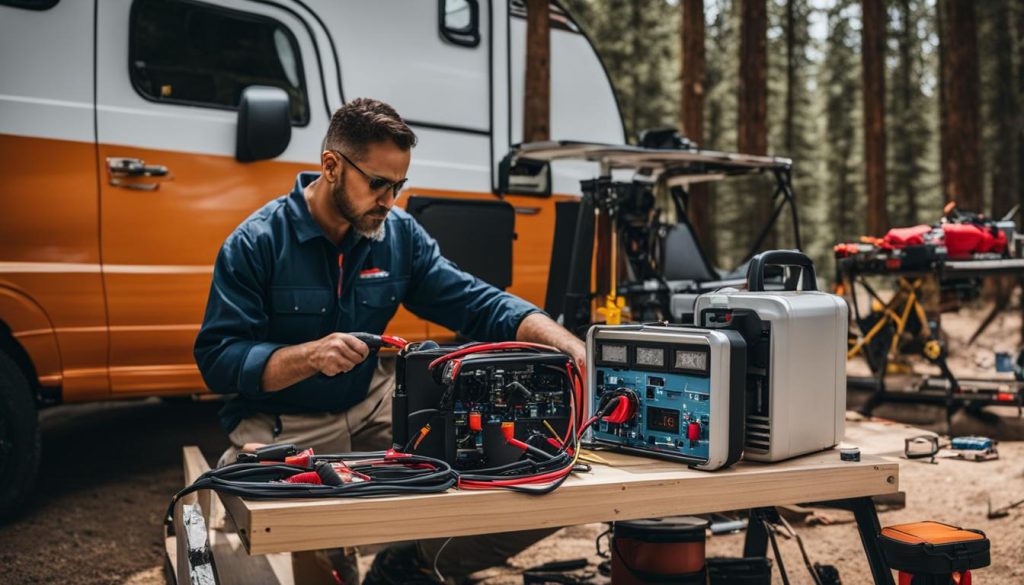
Job Outlook and Duties
The job outlook for RV technicians is highly promising, with a projected increase of 8% to 14% in job opportunities from 2012 to 2022. As an RV technician, you will play a crucial role in diagnosing, maintaining, and repairing various types of recreational vehicles, including appliances and generators.
You can find employment as an RV technician in automotive repair shops, dealerships, and equipment manufacturing facilities. Your duties will include repairing wiring, testing the operation of different components, and preparing cost estimates for repairs.
The job outlook for RV technicians is highly promising, with a projected increase of 8% to 14% in job opportunities from 2012 to 2022.
As an RV technician, you’ll have the satisfaction of ensuring that RV owners can fully enjoy their travel experiences, knowing that their vehicles are safe and in peak performance. Your expertise in diagnosing and resolving issues will contribute to the smooth operation of electrical systems, appliances, plumbing, and other crucial components of RVs.
The median annual wage for RV technicians was $35,000 in 2013, offering a stable income for those in the field.
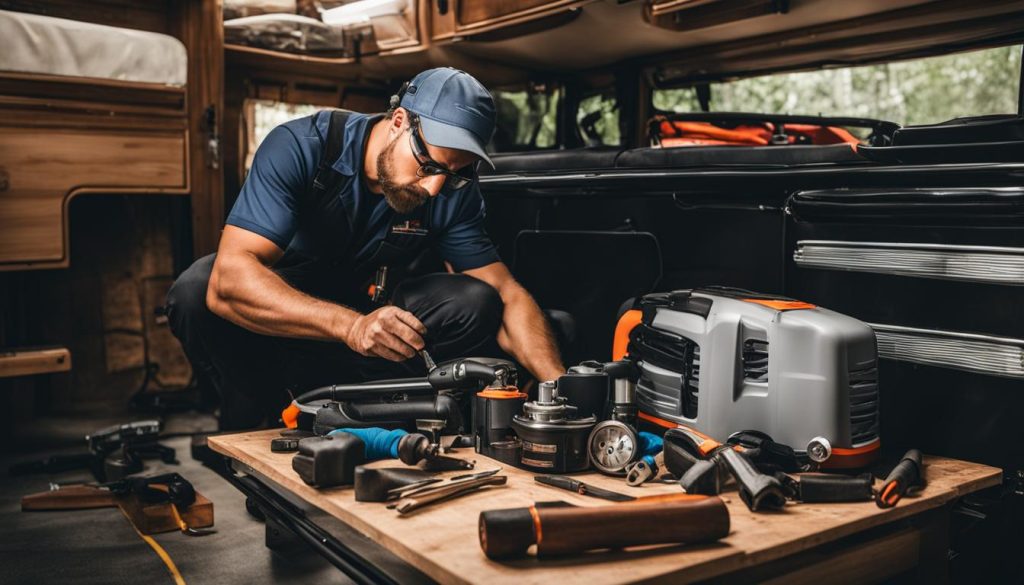
| Mediant Annual Wage (2013) | Job Opportunities (2012-2022) |
|---|---|
| $35,000 | 8% to 14% increase |
Career Path and Advancement
As an RV technician, there is ample opportunity for career advancement and specialization. The RV Technical Institute’s technician career path offers a structured framework for growth and proficiency. It consists of four levels: Level 1, Level 2, Level 3, and Level 4 Master Technician.
To advance through these levels, technicians must complete designated training programs and demonstrate the required knowledge and skills. Each level builds upon the previous one, allowing technicians to acquire a deeper understanding of RV systems and components.
Technicians can also choose to specialize in specific areas of expertise within the RV industry. These specializations include electrical systems, chassis, electronics, appliances, and slideouts. By focusing their skills, technicians can become sought-after specialists in their chosen field.
Certification levels are valid for a specified period, typically five years. To maintain their certification, technicians need to acquire continuing education credits and undergo information and employment verification. This ensures that RV technicians stay up to date with the latest industry developments and maintain their professional standards.
By following the technician career path and continually enhancing their skills and knowledge, RV technicians can unlock new opportunities for growth and advancement within the industry.
RV Technician Career Levels and Specializations
| Level | Description | Specializations |
|---|---|---|
| Level 1 | Entry-level technician | General RV systems |
| Level 2 | Intermediate technician | Electrical systems, chassis |
| Level 3 | Advanced technician | Electronics, appliances |
| Level 4 Master Technician | Master technician | Slideouts, complex systems |
Continuing education, specialized training, and real-world experience can open doors to higher-level positions and increased responsibilities within the RV industry. RV technicians who aspire to leadership roles or entrepreneurship can also pursue additional business training to complement their technical expertise.
Other Career Options
If becoming an RV technician is not the right fit for you, don’t worry, there are alternative career options that may suit your interests and skills. One such option is becoming a home appliance repairer. As a home appliance repairer, you’ll have the opportunity to travel to customers’ homes and install or repair their appliances. The best part is, this career typically does not require a postsecondary education, making it accessible to those with hands-on skills.
Another career path to consider is becoming a small engine mechanic. Small engine mechanics work in repair shops and are responsible for maintaining and repairing engines in various motorized equipment such as lawnmowers, chainsaws, and motorcycles. If you have a knack for mechanical work and enjoy getting your hands dirty, this could be the perfect career for you.
Both of these career options offer plenty of opportunities for those with mechanical abilities and a passion for problem-solving. Whether you choose to become a home appliance repairer or a small engine mechanic, you’ll be working with your hands and helping customers troubleshoot and fix their everyday appliances or equipment.
FAQ
How do I become an RV technician?
To become an RV technician, you will need to complete the necessary training and obtain certification. Several RV technician training programs are available, such as the RV Technical Institute’s technician training program. This program provides hands-on training and instruction. Additionally, you can also pursue vocational certificate programs in RV maintenance and repair technology.
What skills and qualifications do I need to become an RV technician?
As an RV technician, you’ll need a combination of technical skills and qualifications. Good customer service skills are essential, as you’ll often interact with clients. You should be familiar with hand and power tools, and have knowledge of computers, electronics, and construction. Key skills needed include manual and finger dexterity, critical thinking, problem-solving, and the ability to select the right tools for the job. Employers may also require a high school diploma or GED, and some may prefer candidates with vocational certificates or industry certifications.
What is the job outlook for RV technicians?
The job outlook for RV technicians is promising, with job opportunities expected to increase by 8% to 14% from 2012 to 2022. RV technicians are responsible for diagnosing, maintaining, and repairing various types of RVs, including appliances and generators. They work in automotive repair shops, dealerships, and equipment manufacturing facilities. Duties include repairing wiring, testing the operation of various components, and preparing cost estimates.
Can I specialize in a specific area as an RV technician?
Yes, as an RV technician, there is room for career advancement and specialization. The RV Technical Institute’s technician career path includes four levels of training and proficiency: Level 1, Level 2, Level 3, and Level 4 Master Technician. Each level requires completion of designated levels and the demonstration of required knowledge and skills. Technicians can specialize in areas such as electrical systems, chassis, electronics, appliances, and slideouts. Certification levels are valid for a specified period, and technicians need to acquire continuing education credits and undergo information and employment verification to re-certify.
What are some alternative career options related to RV technician?
If becoming an RV technician is not the right fit for you, there are alternative career options to consider. Home appliance repairers travel to customers’ homes to install or repair appliances and typically do not require a postsecondary education. Small engine mechanics work in repair shops and maintain and repair engines in various motorized equipment. Both careers offer opportunities for those with mechanical abilities and hands-on skills.

